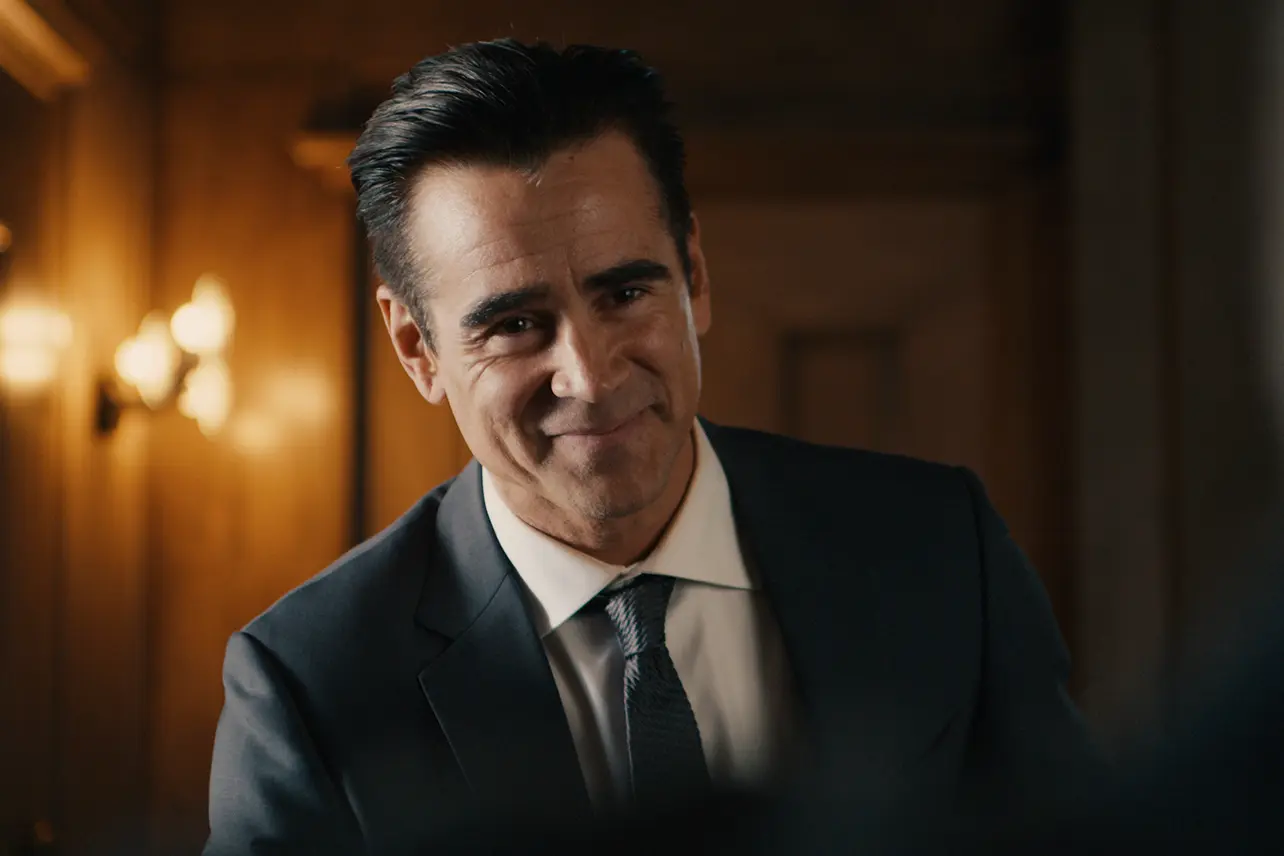Apple TV+’s Sugar initially presents itself as a conventional detective drama. The series follows John Sugar, played by Colin Farrell, a private investigator attempting to solve the mystery of a young girl’s disappearance. At first glance, the show seems to rely on familiar noir tropes, featuring a determined investigator, a missing person, and a web of deceit.
However, as the story unfolds, it becomes clear that Sugar diverges from typical crime dramas by introducing unexpected layers to its characters and plot. John Sugar is not simply a human detective but a complex figure whose journey explores the boundaries between alien detachment and human empathy.
The turning point of the series comes in episode six when Sugar reveals a major twist. He and the members of his secretive society are aliens. Their original mission on Earth is purely observational. They are meant to study human behavior without interference. However, Sugar’s curiosity and moral engagement lead him to break this rule. His investigation into Olivia’s disappearance pushes him beyond mere observation, resulting in revelations that have serious consequences for himself and his alien companions. This twist redefines the series by blending science fiction with crime drama while exploring themes of identity and morality.
In the finale, Sugar faces a pivotal choice. While his alien allies prepare to leave Earth, he hesitates. Ultimately, he decides to remain on the planet, a choice shaped by his growing understanding of humanity. Despite his extraterrestrial origin, his time among humans has changed him. He realizes he has developed empathy and emotional depth that surpasses that of his alien peers. This decision not only highlights his personal growth but also sets the stage for future storylines, suggesting a continued engagement with human society and unresolved mysteries.

Sugar Embraces Humanity, Faces Moral Choices, and Stays on Earth for Sister
Throughout the series, Sugar struggles with his emotions and attempts to suppress human vulnerabilities. In the early episodes, he questions his feelings and tries to avoid violent confrontations, maintaining a controlled, almost alien detachment. Yet over time, he becomes increasingly influenced by human experiences. By the season finale, Sugar has accepted both the best and worst aspects of humanity, acknowledging his capacity for compassion as well as moral compromise. This transformation emphasizes the show’s exploration of what it means to be human, especially through the perspective of someone who was never meant to fully participate in human life.
Henry, another alien character, provides a counterpoint to Sugar’s arc. While Sugar intervenes in human affairs, Henry aligns himself with Pavich, a murderer, and observes without interfering. This contrast demonstrates how nature and nurture together shape behavior. Sugar’s empathy drives him to take action, while Henry’s adherence to his mission shows how predisposition and circumstance guide moral choices. The series uses its divergent paths to explore ethical questions, illustrating how environment and innate tendencies together influence identity.
A key motivator for Sugar’s decision to stay on Earth is the unresolved fate of his sister, Djen. After uncovering evidence suggesting she may still be alive, Sugar refuses to leave with his alien companions. Her potential survival injects urgency and purpose into his continued presence on the planet, framing his choice as both a personal and moral commitment. This unresolved mystery ensures narrative momentum for a possible second season and highlights Sugar’s transformation from detached observer to active participant in human affairs.

Humans Discover Aliens, Politicians Target Visitors, Sugar Chooses Empathy Over Leaving Earth
The finale introduces a significant external threat in the form of humans who are aware of the aliens’ existence and view them as dangerous. High-level politicians, including a senator connected to Pavich, respond to Sugar’s interference by targeting the alien visitors. This conflict emphasizes a central theme of the series: the collision between human self-interest and extraterrestrial observation. While Sugar’s fellow aliens plan to leave Earth for safety, he remains, recognizing that his empathy and intervention can make a meaningful difference in human lives.
Sugar’s investigation also uncovers hidden layers within human relationships. He discovers that Jonathan, a figure connected to Olivia, had a secret affair with Rachel, Bernie’s first wife, adding complexity to the mystery surrounding Olivia’s disappearance. While Sugar chooses not to expose this information, the revelation highlights the intricate web of human motivations and ethical dilemmas in the series. Jonathan’s protective actions for Olivia emphasize themes of familial loyalty, secrecy, and moral ambiguity, enriching the noir-inspired storytelling.
By the end of season one, Sugar’s initial mission has expanded beyond solving a single case. He now faces multiple unresolved mysteries, including the fate of his sister, the truth behind Rachel’s death, and the continued threat posed by humans intent on exterminating aliens. The season sets the stage for high-stakes tension, with Sugar needing to operate in the shadows while confronting dangerous individuals like Henry, whose descent into darkness may pose a lethal threat. This positioning promises a blend of science fiction intrigue, crime-solving, and ethical exploration in the next season.
Sugar stands out by combining crime drama, science fiction, and moral exploration. Colin Farrell’s portrayal of John Sugar captures the tension between alien detachment and emerging humanity, driving a narrative focused on identity, empathy, and ethical responsibility. Season one concludes with Sugar choosing to remain on Earth, embracing both his humanity and the unresolved personal and external conflicts that promise a compelling continuation. With layered character development, intricate plotting, and genre-bending storytelling, Sugar positions itself as a thought-provoking and emotionally resonant series on Apple TV+.



